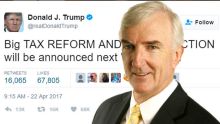McGrath Ltd's chairman Cass O'Connor made some interesting connections to explain how things had gone so horribly wrong since it went public in December last year.
Vendors have gone on a sales strike, fearing that if they sell "they will not get back into the market", O'Connor told investors at the company's AGM on Wednesday.
More BusinessDay Videos
CEO discusses McGrath's future
Speaking to Fairfax in November, McGrath CEO Cameron Judson admits FY16 saw an unprecedented decline in volumes and listings, but predicts a more positive 2017.
This is why sky-high prices have sent the volume of sales plunging to levels that severely dented McGrath's prospectus forecasts from this time last year.
It led to an impassioned plea from O'Connor about what dark forces are being unleashed.

"When our society's teachers, nurses, police and emergency services personnel cannot afford to live in the communities they serve, housing affordability can very quickly become a factor in social and economic dislocation," she told investors.
"The political upheavals of the US earlier this month and the UK in July were born from similar issues, and while we don't have the hate politics of those countries' 2016 campaigns, to be complacent about this from our positions of relative security would seem unwise."
CBD shares the sentiment about housing affordability – but dare we point out that London is not known for its cheap real estate and voted strongly against Brexit. And Donald Trump did not fare well in his adopted home town of New York either.
We are not sure if company founder, John McGrath, agrees with her assessment of the property market either. He was tweeting just last week how "Sydney real estate is just like gold" and it sounds like there has never been a better time to buy. Or sell.

Sydney real estate is like gold and in my opinion, despite the boom of 2012-16, prices will continue to rise. https://t.co/834JQx0h6P
— John McGrath (@johnmcgrath100) November 8, 2016
Off the rank
Cabcharge used to be criticised for the fact that its boardroom was stuffed with directors who were holding on to their seats for too long. Not any more.

A day prior to its Thursday AGM, Stephen Stanley – the man who helped Paul Little build Toll Holdings into a logistics behemoth – quietly announced his resignation barely a year after he joined the taxi payment provider's board.
"On behalf of the board, the current chairman Russell Balding thanks Mr Stanley for his contribution," said Cabcharge in a very brief statement.

The announcement was overshadowed by the news that Cabcharge finally found a replacement for Balding.
Just 24 hours before he was due to step down from the post after Thursday's AGM, Balding announced that another recent hire, PricewaterhouseCoopers veteran Rick Millen, will take the chair following the meeting.
At least Cabcharge will retain the services of 20-year board veteran, Donn McMichael. He wanted to retire, but Balding convinced him to stay after admitting McMichael's exit would leave the group slightly short of institutional knowledge.
"The board recommends that shareholders vote to re-elect Mr McMichael as after my retirement the average tenure for the remaining non-executive directors will be less than two years," said Balding.
Stanley's departure means Cabcharge will be left with three non-executive directors after tomorrow's shareholder meeting.
At this rate, Balding might be forced to hang around as well.
Very Flexi
Just weeks after John Skippen was forced to resign from the Super Retail Group board – having presided over the Slater and Gordon debacle as its chairman – Flexigroup offered an impassioned defence of Skippen's involvement with the company – before announcing he will resign at the end of next year.
"Despite John having endured some adverse publicity relating to another public board, I would like to emphasise how much value he has added to Flexigroup over 10 years," Flexigroup chairman Andrew Abercrombie said
"His deep understanding of our most important channel partner, and broad commercial experience as a chartered accountant and retailer, not to mention extensive management experience have added huge value to Flexigroup. I have asked John to remain on the board through 2017 calendar year especially to contribute to the induction of our new board members in the context of risk and audit. John will step down after this time."
The reference to Flexigroup's most important channel partner is of course Harvey Norman, where Skippen worked for many years. Indeed he was instrumental in setting up the deal with Flexigroup, according to reports.
It is probably why Abercrombie has been able to stare down any investor dissent and keep Skippen on board for another year.
Skippen was forced to resign from the Super Retail board on the day of its shareholder meeting last month when proxy advisors and institutional investors opposed his re-election.
Got a tip? ckruger@fairfaxmedia.com.au















